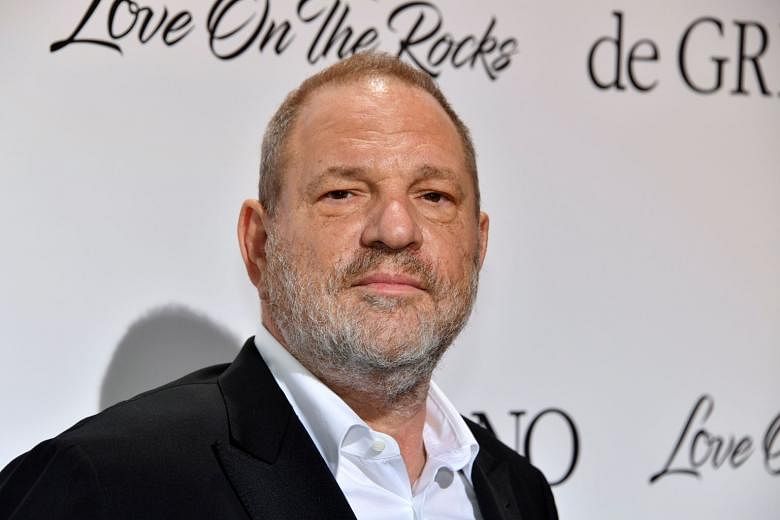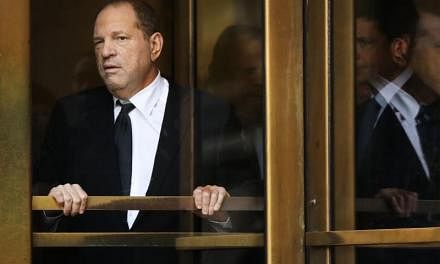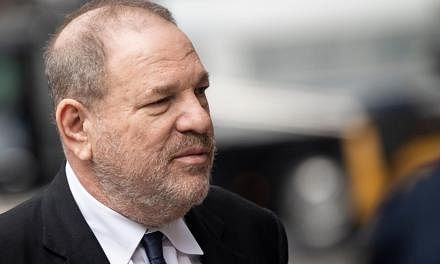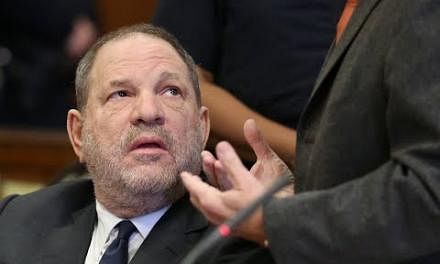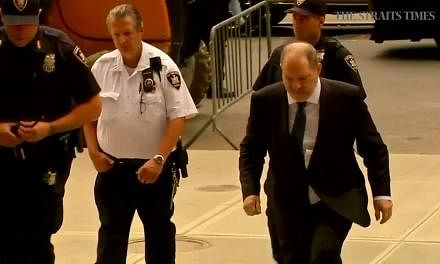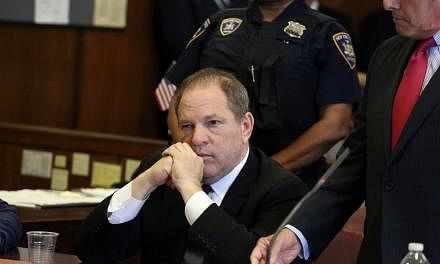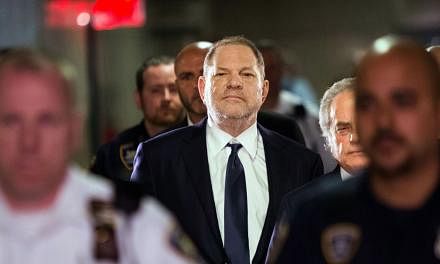WASHINGTON (WASHINGTON POST) - A former assistant to Harvey Weinstein has broken a nondisclosure agreement she signed nearly two decades ago and is speaking out about sexual harassment she says she observed - and experienced firsthand - while working under the now-disgraced Hollywood mogul.
In a lengthy interview with the Financial Times, Zelda Perkins became the first of Weinstein's former employees to break such a legal contract to speak candidly about the film producer's alleged behaviour.
In doing so, Perkins said she wanted to cast light on how "egregious" nondisclosure agreements, often referred to as NDAs, can be in silencing and shaming victims.
"My entire world fell in because I thought the law was there to protect those who abided by it," Perkins told the newspaper. "I discovered that it had nothing to do with right and wrong and everything to do with money and power."
Perkins told the Financial Times that Weinstein sexually harassed her "on every occasion I was alone with him" in the late 1990s, when she was one of his assistants in the London office of Miramax, the company Weinstein co-founded and led at the time.
At the time, Weinstein's assistants frequently worked from his hotel room when he was in town - and when they were alone, Perkins said, the Hollywood mogul would walk around naked or ask her to watch him bathe.
"I often had to wake him up in the hotel in the mornings and he would try to pull me into bed," Perkins told the newspaper.
The incident that prompted her to take legal action against Weinstein, however, happened to a female colleague when they were all in Venice for a film festival in 1998, Perkins said.
"She was white as a sheet and shaking and in a very bad emotional state. She told me something terrible had happened. She was in shock and crying and finding it very hard to talk. I was furious, deeply upset and very shocked.
I said: 'We need to go to the police,' but she was too distressed. Neither of us knew what to do in a foreign environment."
In a generic statement to the Financial Times, a representative for Weinstein denied allegations of nonconsensual sex and retaliation.
Perkins and her colleague, whom she did not name in the FT interview, ended up going to the London law firm Simons Muirhead & Burton.
Though Perkins said she originally wanted to take the case to Disney, Miramax's parent company, lawyers cautioned her that Weinstein would "destroy" her credibility and her family.
She said she was told a settlement was the only viable option.
"My driving motivation was to create safeguards to protect future employees," Perkins told the FT.
She said she gave the London lawyers "a list of demands aimed at controlling his behaviour, such as a commitment that he receive medical treatment and the creation of a proper human resources complaints procedure at Miramax so that people would be aware of their rights and could complain about harassment if they needed to."
Perkins and her colleague settled for £250,000, which was to be divided between the two women. Part of the agreement dictated therapy for Weinstein "for as long as his therapist deems necessary," as well as other measures aimed at protecting others from his behaviour, Perkins told the newspaper.
"Miramax said that within six months of its agreement with Ms Perkins, the company would appoint three "complaint handlers" who would investigate future harassment allegations. It also agreed to provide proof of how its staff were told about the new procedures. Crucially, if a complaint against Mr Weinstein occurred within two years of the contract and it resulted in a settlement of either £35,000 or six months' salary, Miramax agreed to report the matter to Disney - or to dismiss Mr Weinstein.
"Although these and other obligations ended up in the contract, it is not known whether Miramax fully abided by them."
Ultimately, the lengthy negotiation process left her "broken" and feeling emotionally exhausted and ashamed, Perkins told the FT.
"I want to call into question the legitimacy of agreements where the inequality of power is so stark and relies on money rather than morality," she told the newspaper.
"I want other women who have been sidelined and who aren't being allowed to own their own history or their trauma to be able to discuss what they have suffered. I want them to see that the sky won't fall in."
Perkins' public account comes little more than two weeks since a pair of investigative reports, first from the New York Times and then from the New Yorker, exposed decades of sexual harassment and assault claims against Weinstein.
In the wake of those stories, Weinstein issued a long, scattered statement in which he begged for "a second chance in the community," referenced Jay-Z lyrics and declared he would take on the National Rifle Association.
"I appreciate the way I've behaved with colleagues in the past has caused a lot of pain, and I sincerely apologise for it," he said in his Oct 5 statement. "Though I'm trying to do better, I know I have a long way to go."
Soon after, Weinstein reportedly flew to Arizona to check in to a sex-addiction rehabilitation centre. Since then, more than 40 women have come forward to accuse the disgraced film producer of grossly inappropriate behaviour. Through them all, Weinstein - or at least his representatives - mostly stayed quiet, hewing to generic rebuttals that do not name the accusers.
Notable exceptions have been an Oct 5 interview with the New York Post, in which Weinstein insinuated that Ashley Judd had levelled accusations against him because she was "going through a tough time right now."
Weinstein also specifically disputed claims by Oscar-winning actress Lupita Nyong'o, who detailed in an op-ed for the New York Times a pattern of predatory behaviour Weinstein had directed at her, starting when she was still a student at the Yale School of Drama.
Since the scandal has exploded, Weinstein has been fired from the Weinstein Company, which he co-founded after leaving Miramax.
The fallout has also prompted some Hollywood staffing agencies to train its workers to report sexual harassment or other inappropriate conduct. Debra Katz, a civil rights and employment lawyer in Washington, told The Washington Post that nondisclosure agreements - which assistants commonly sign in the industry - cannot block someone from filing a complaint to the Equal Employment Opportunity Commission. Assistants who know their bosses are sexually assaulting others, but who do not disclose such behaviour, could later be liable for aiding and abetting sexual misconduct, Katz said.
A Weinstein spokesman returned to the boilerplate rebuttal in response to Perkins' interview with the Financial Times: "The FT did not provide the identity of any individuals making these assertions. Any allegations of nonconsensual sex are unequivocally denied by Mr Weinstein. Mr Weinstein has further confirmed that there were never any acts of retaliation against any women for refusing his advances."
